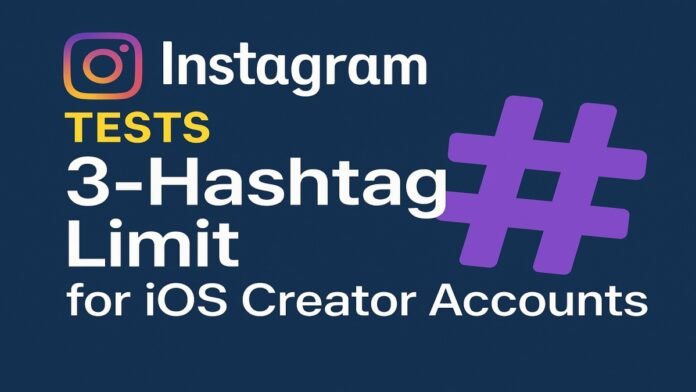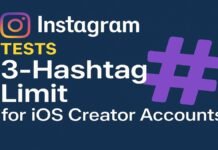
Key Points:
- Instagram began testing a 3-hashtag limit on November 21, 2025, showing a message “You can only add 3 hashtags to your caption” to affected users
- The restriction appears to target only iOS Creator accounts, while standard accounts on iOS and all Android users can still add up to 30 hashtags
- The test is being conducted globally, with users from different parts of the world reporting the same limitation on their Creator accounts
- This move follows TikTok’s recent decision to limit hashtags to 5 per post, suggesting Meta may be following competitor strategies
- Instagram has not made an official announcement, indicating the feature is still in early testing phase and may not be permanent
- Small and growing creator accounts could face the biggest impact, as they rely heavily on hashtag analytics to reach target audiences
- The test comes amid other Instagram hashtag changes, including removing the ability to follow hashtags and algorithmic ranking changes
On the morning of November 21st, many Instagram users suddenly began seeing a message while creating posts, “You can only add three hashtags to your caption,” meaning that users can only add three hashtags to their captions. This abrupt change appeared without any prior warning from Instagram, catching creators off guard. Although Instagram has not yet made an official announcement regarding this change, it’s clear that it may be part of a testing phase. This limit hasn’t yet been implemented for every user, but many are experiencing this issue across different regions globally. The sudden implementation suggests Instagram is gathering data on how this restriction affects user behavior and content engagement before deciding on a wider rollout.
Platform Differences, iOS Creator Accounts Targeted
Significant differences were observed between Android and iPhone users during testing, with platform-to-platform differences clearly visible. On Android, users are able to add up to 30 hashtags as usual, regardless of whether they have a standard account or creator account. Standard Account shows no limit, and Creator Account shows no limit on Android devices. On iPhone, the situation is reversed. Creator Account faces the 3-hashtag limit, while Standard Account shows no limit. This clearly means that creator accounts on iOS have been selectively included in this test. Instagram appears to be using a phased approach, targeting a specific subset of users to measure impact before potentially expanding the restriction. The selective testing on iOS Creator accounts suggests Meta is particularly interested in how this change affects professional content creators who rely heavily on hashtags for discoverability.
Global User Reactions and Concerns
Reactions from users globally have also begun to pour in. On iOS, posts have appeared from various parts of the world, in which users have complained about not being able to add more than three hashtags. This clearly indicates that Instagram is testing this globally, not limiting it to specific geographic regions. On X (formerly Twitter), users have shared posts expressing frustration about the limitation, with some calling it “ridiculous” and others worried about their reach dropping. It’s worth noting that under normal circumstances, up to 30 hashtags are allowed on Instagram, a limit that has been in place for years and has become a core part of many creators’ content strategies. The widespread reports from different countries confirm that Meta is conducting a worldwide test to gather diverse data points before making any final decisions.
Is Meta Preparing for a Major Change Ahead?
If Meta officially implements the hashtag limit in the future, it could have the biggest impact on small and growing creator accounts. Users who used hashtags to reach the right audience through analytics will now have to adopt new strategies. This potential change reflects Instagram’s broader shift away from hashtag-based discovery toward keyword-based SEO and algorithmic content understanding. In recent years, Instagram has made several quiet but significant changes, including removing the ability to follow hashtags, eliminating the ‘Recent’ tab under hashtag pages, and making hashtag feeds non-chronological. Adam Mosseri, Instagram’s head, confirmed these changes were made because the recent section was being abused by bad actors, and spam content would flood feeds with borderline-violating posts. By reducing hashtag limits, Instagram may be pushing creators to focus more on caption quality, keyword usage, and overall content relevance rather than hashtag quantity.
Uncertainty About Permanent Implementation
It’s unclear whether this change will be permanent or whether it will be implemented across the platform, this is just a test for a limited number of users. If you’re seeing this limit on your Instagram, don’t panic. Instagram may provide official information on this soon. The company has a history of testing features that never make it to full rollout, and the current test could be modified based on feedback. Creators are advised to monitor their analytics closely during this period and begin experimenting with alternative discovery strategies, such as optimizing captions with relevant keywords, focusing on engagement-driven content, and leveraging Instagram’s other features like Reels and Stories. The testing phase gives Instagram valuable data about how hashtag restrictions affect user experience, spam reduction, and content quality, which will inform their final decision on whether to make this a permanent platform-wide policy.



















































